Key takeaways
- Political polarization hinders effective communication and understanding, leading to strained relationships and distrust in institutions.
- Listening to political podcasts can foster empathy and encourage deeper conversations, moving away from confrontational debates.
- Strategies like practicing curiosity, sharing personal stories, and small acts of empathy can help bridge political divides.
- Engaging with diverse perspectives in podcast listening enriches understanding and combats the echo chamber effect.
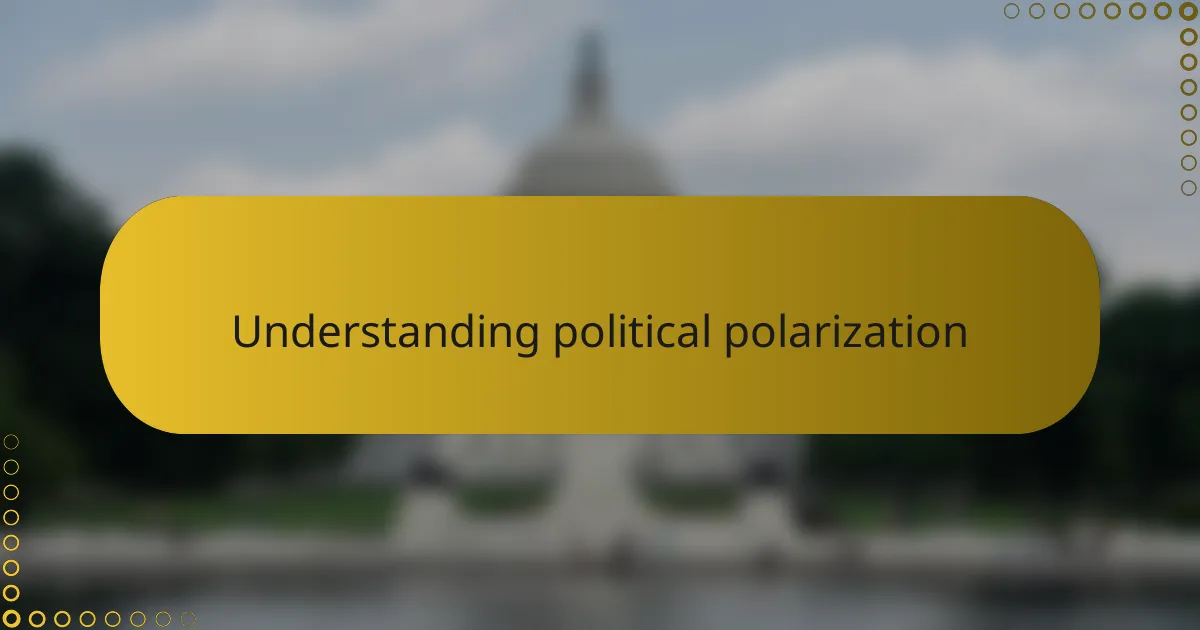
Understanding political polarization
Political polarization feels like two distant islands, each surrounded by its own set of beliefs and values, rarely venturing to explore the other side. I’ve noticed this divide even among close friends, where conversations quickly turn into debates that seem impossible to resolve. It makes me wonder—are we choosing sides, or is the divide shaping who we become?
What strikes me most about political polarization is how it affects our ability to listen. When I reflect on past arguments, I realize that understanding breaks down not just because of differing opinions, but because we stop genuinely trying to hear one another. Isn’t it ironic that with more access to information than ever before, connection feels farther away?
Sometimes, I catch myself simplifying complex issues into black-and-white terms, a habit I suspect many of us share. This urge to categorize can deepen the divide, but recognizing it has helped me pause and ask: what stories or fears lie behind someone else’s perspective? That small question can open doors that outright disagreement often closes.
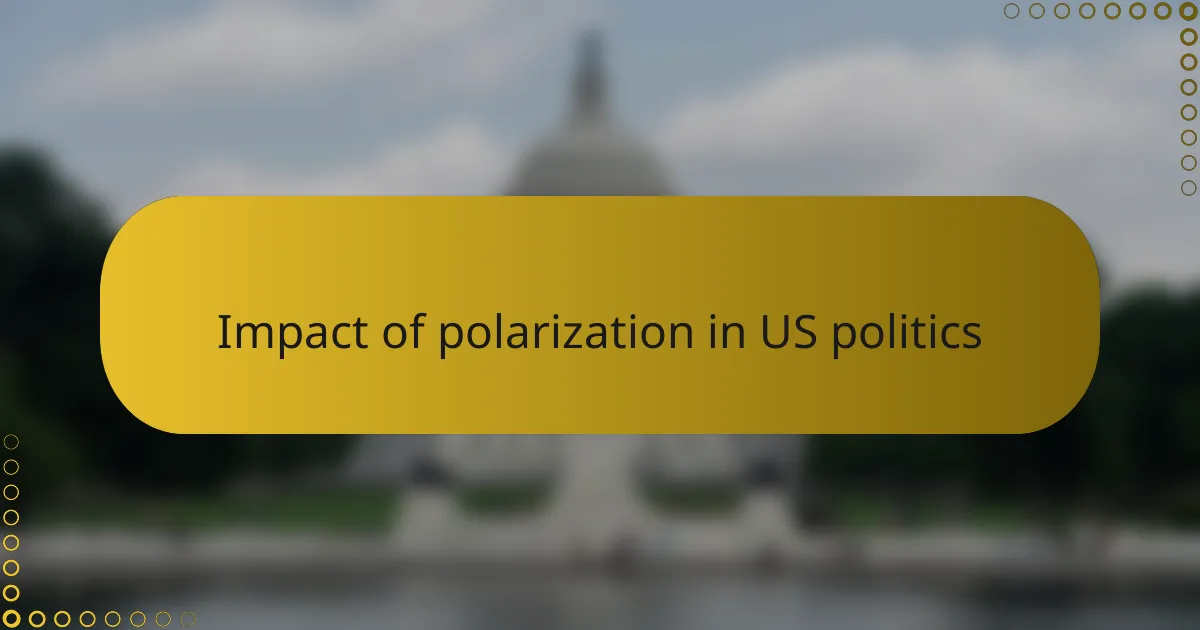
Impact of polarization in US politics
Polarization doesn’t just shape conversations; it shapes governance too. I’ve watched how gridlock in Congress stalls decisions that should be straightforward, leaving critical issues unresolved. It makes me question—how effective can a system be when collaboration feels like a distant dream?
On a personal level, I’ve seen families strained and friendships tested because politics becomes more than opinion—it becomes identity. It’s painful to realize that the very fabric of community frays when empathy takes a backseat to winning arguments.
What worries me most is the erosion of trust—not just in politicians, but in institutions that once held us together. If we can’t trust each other or the structures that support democracy, what hope do we have of bridging these divides? It’s a tough question I keep coming back to.
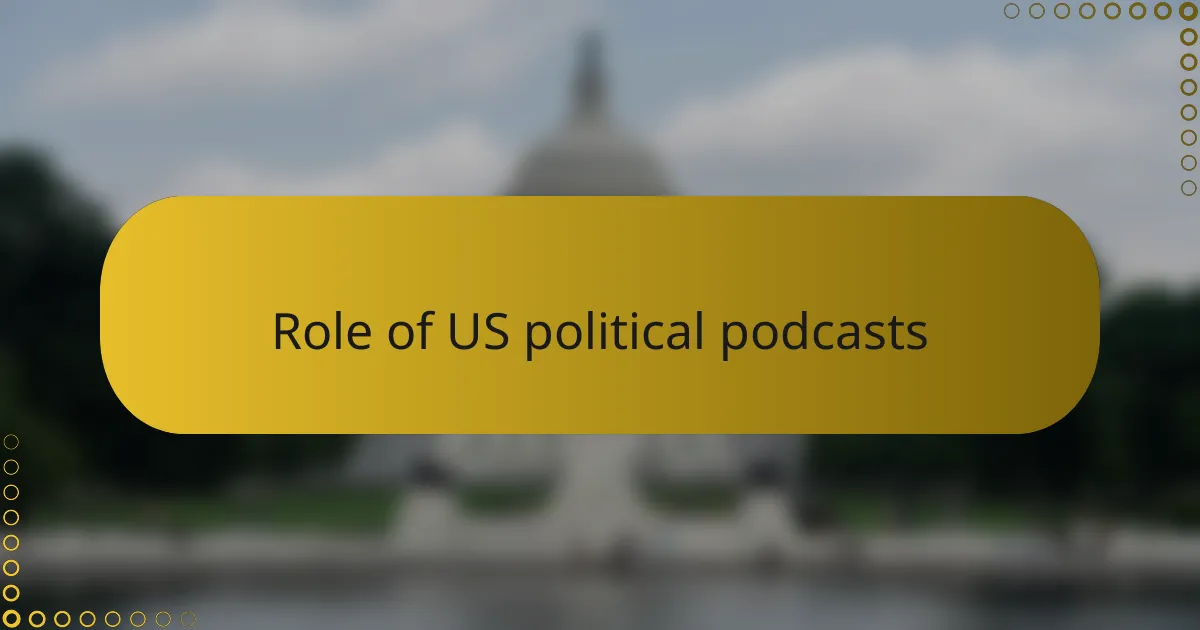
Role of US political podcasts
US political podcasts have become, in my experience, a unique space where voices from all sides can meet without the usual interruptions or heated exchanges. I find it refreshing how they allow for deeper dives into issues, far beyond the soundbites that often fuel division. Don’t you think having a platform that encourages thoughtful discussion can soften some of the edges polarization sharpens?
What really stands out to me is how these podcasts can humanize the “other side.” When I listen, I hear stories and perspectives that challenge my assumptions. It makes me wonder—if more people spent time listening rather than debating, could we start to rebuild some of the empathy that’s been lost?
Of course, podcasts aren’t magic cures. But from my perspective, they offer a chance to slow down and reflect, which is something we desperately need. Could this quieter, more thoughtful approach be a small step toward bridging a divide that feels so vast? I certainly hope so.
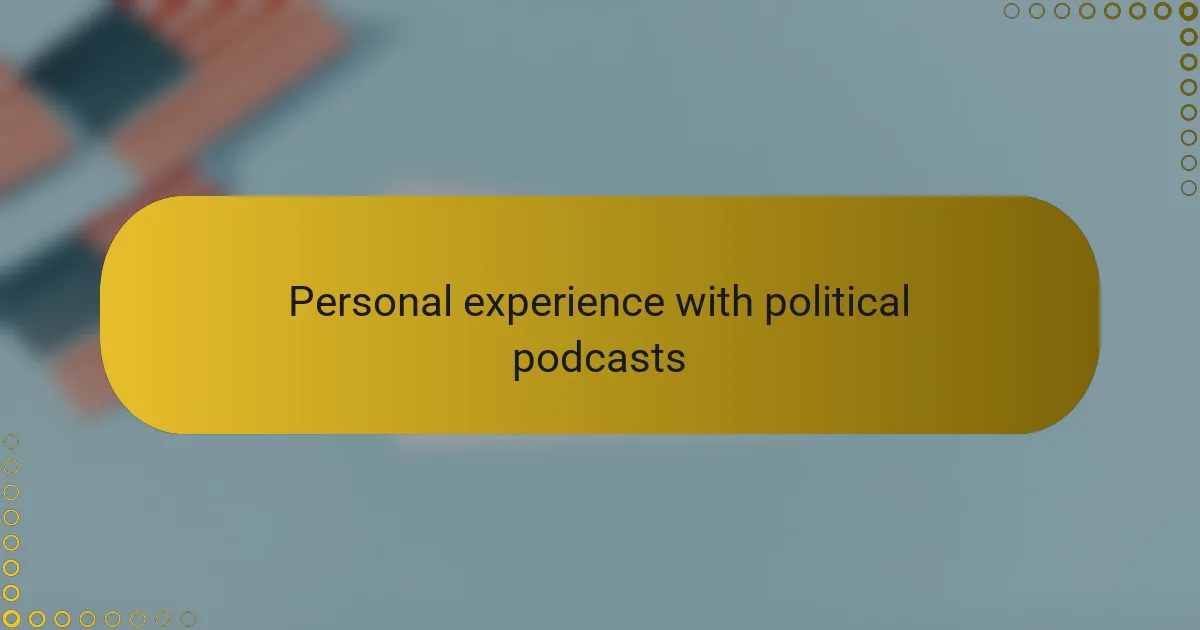
Personal experience with political podcasts
Diving into political podcasts felt like stepping into a room where I could listen without feeling the pressure to immediately argue back. I remember tuning into a particularly thoughtful episode that challenged my own views, and instead of feeling defensive, I felt curious—something rare in today’s polarized climate. Have you ever had a moment where hearing a calm, reasoned voice made you reconsider your stance?
Sometimes, I find myself reflecting on how these podcasts have changed my approach to conversations offline. Hearing nuanced discussions makes me more patient and open to complexity, even when friends or family get heated. It’s not about agreeing with everything but appreciating the human stories behind the opinions.
Yet, I can’t help but wonder if this experience is rare. How many people are willing to step into that slower, more deliberate space? For me, political podcasts have been a small refuge from noise and shouting—offering a chance to reconnect with the idea that listening is an act of respect, not weakness.
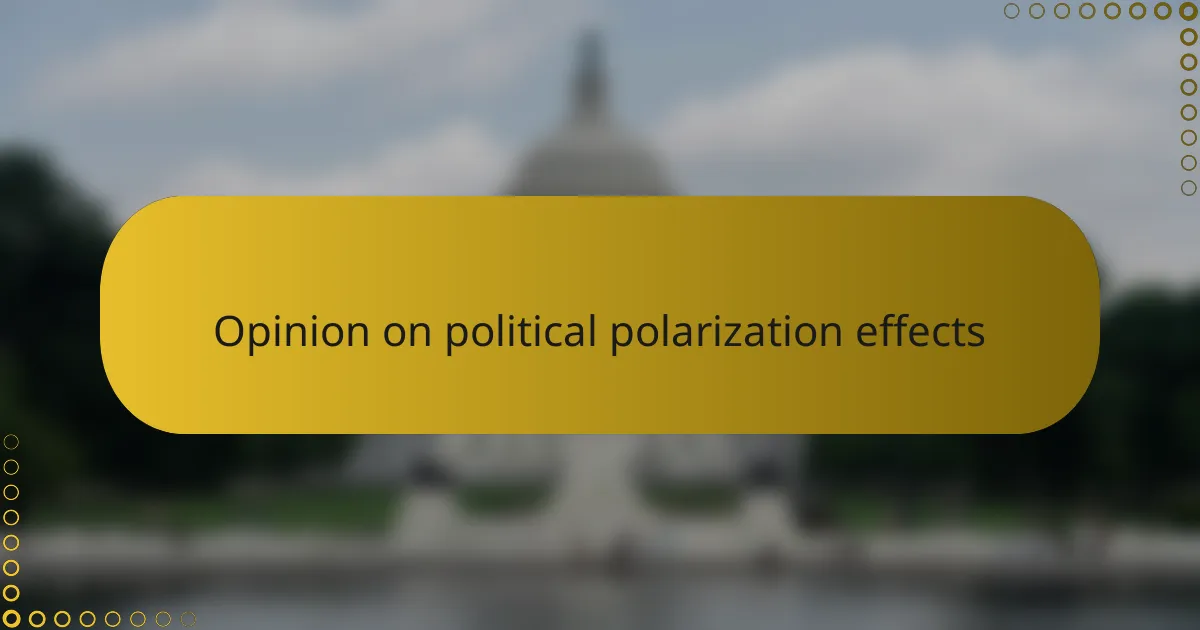
Opinion on political polarization effects
Political polarization, from what I’ve seen, tends to harden attitudes rather than open minds. It’s like watching a fence get taller with every disagreement, making genuine connection harder to reach. Have you noticed how it turns simple conversations into battlegrounds, where winning feels more urgent than understanding?
I’ve also felt that polarization saps our collective energy. Instead of focusing on problem-solving, a lot of time is spent defending entrenched positions. It’s exhausting, and I wonder if we’re losing sight of what we have in common beneath all the noise.
At its worst, polarization breeds distrust that cuts deep—not only between individuals but toward the very institutions meant to serve us. When I reflect on this, it makes me question how we can rebuild any sense of community if suspicion becomes the default. Isn’t that the biggest challenge we face today?
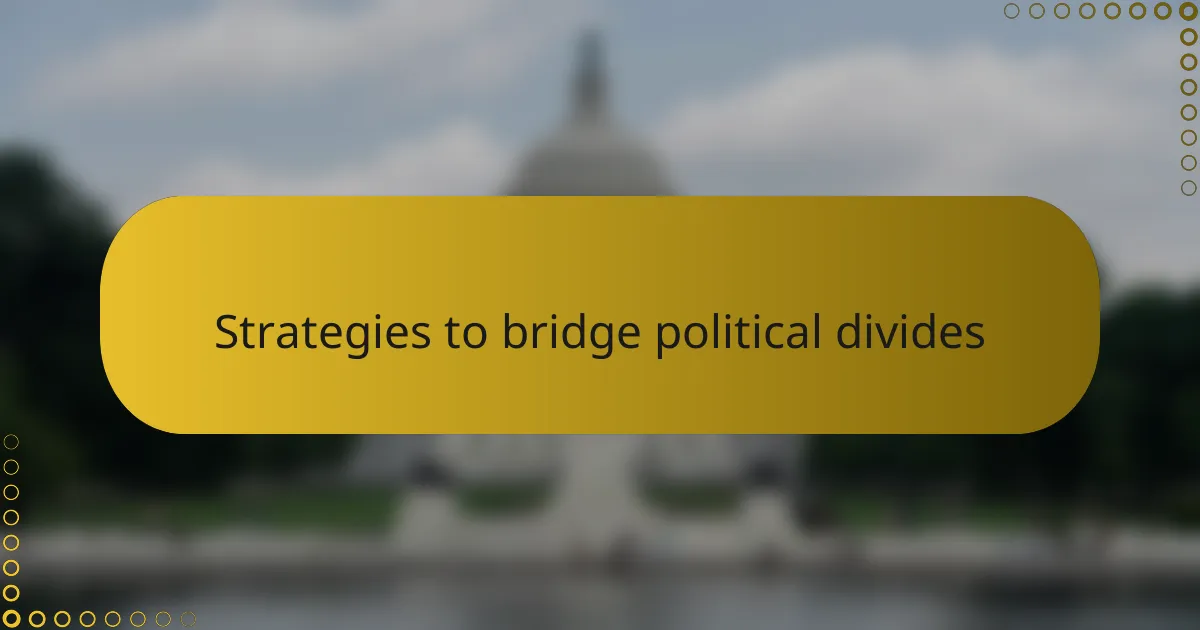
Strategies to bridge political divides
One strategy I’ve found valuable in bridging political divides is simply making space for genuine curiosity. Instead of jumping to rebut or defend, I try to ask questions that invite others to explain their views. It’s amazing how often this shifts the tone from confrontation to conversation.
I’ve also noticed that sharing personal stories rather than abstract arguments can create unexpected connections. When someone hears about my own struggles or hopes behind a political stance, the distance between us feels smaller. Have you ever experienced a debate that softened once real life was brought into it?
Finally, I believe small acts of empathy—like acknowledging the validity of someone’s feelings even when you disagree—go a long way. It’s uncomfortable at first, but when I model this, I see people lower their guard. Could empathy be the quiet, radical step we need to heal these divides?
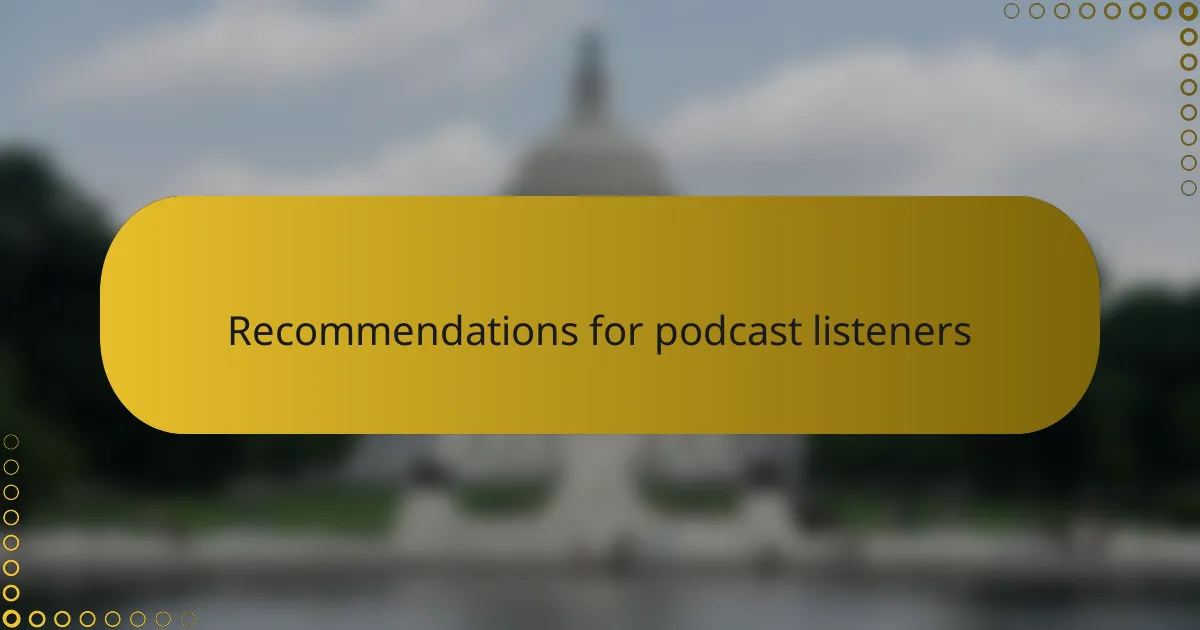
Recommendations for podcast listeners
When I listen to political podcasts, I’ve learned it’s crucial to approach each episode with an open mind. Instead of hunting for points to dispute, I try to absorb new perspectives, even those that challenge my beliefs. Have you ever noticed how just being curious can turn listening into a surprising act of connection?
I also recommend varying your podcast lineup. Engaging with voices across the spectrum—not just those that echo your own views—has helped me see the complexity behind political labels. It’s not easy at first, but this mix makes the conversation richer and feels less like an echo chamber.
Lastly, I find it helpful to take notes or reflect after listening. Sometimes a single episode sparks questions or emotions that I carry into real-life discussions. Do you think that slowing down and digesting what we hear could be the missing step toward more respectful dialogue? For me, it’s made all the difference.